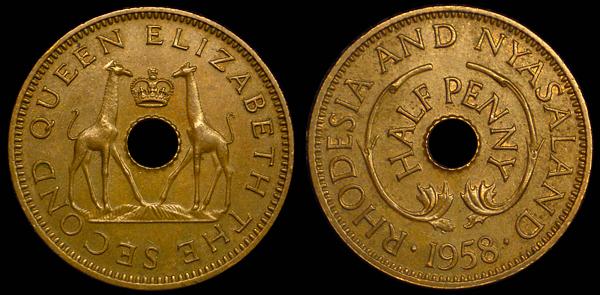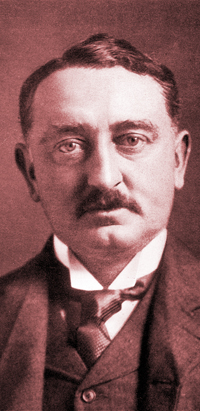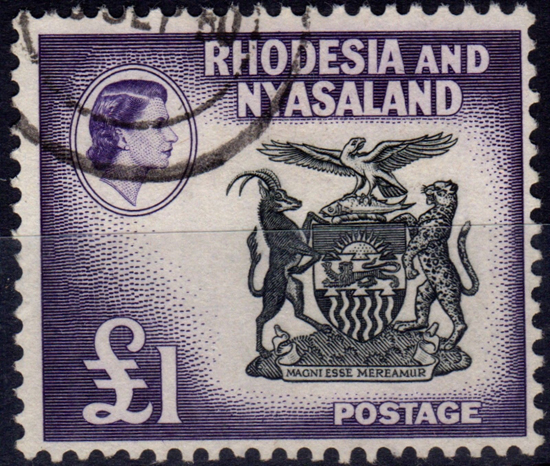
HALF PENNY COIN - RHODESIA AND NYASALAND - GIRAFFES
(KM 1)
Date: 1958
Obverse: Giraffes standing facing each other with crown in between - THE SECOND QUEEN ELIZABETH
Reverse: Sprigs, Date, Denomination and Country Name - Half Penny / 1958 / Rhodesia and Nyasaland
Engraver: Bernard Ralph Sindall
|
This is a bronze 1/2 penny coin of the Federation of Rhodesia and Nyasaland, also known as the Central African Federation or CAF. These coins were engraved by the sculptor Bernard Ralph Sindall. Sindall had a prolific body of work as a die engraver producing dies for Rhodesia, Ceylon, Thailand, Mauritius, Jersey, and Guernsey among others. This coin was minted in 1958 under the tenure of the Governor-General Simon Ramsay, the 16th Earl of Dalhousie. Ramsay was the last Governor-General of the federation before it was dissolved in 1963. The territory that would become known under variations of the name Rhodesia began as a landlocked territory staked out by the British South Africa Company (BSAC). The BSAC was an amalgamation of the Central Search Association headed by the British businessman and mining magnate Cecil Rhodes and the London-based Exploring Company Ltd. which received a Royal Charter in 1889. The company was headed by Rhodes, James Hamilton, the 2nd Duke of Abercorn, and financier Alfred Belt with the intent of exploiting mineral resources south of the Zambezi and Mashonaland. The territory was initially named for the different areas within the territory (Mashonaland, Matabeleland, Barotsland, etc.) and it was known collectively as Zambesia, the name prefered by Rhodes, after the Zambizi river that cut through the territory. White settlers to the area informally named the territory Rhodesia after Cecil Rhodes, a founder of the company, the managing director and driving force of the enterprise and in 1895 the name was made official by the company. Of course the ambitions of the company did not go unopposed by local indigenous leaders. The Pioneer Column, about 100 volunteers, was raised by the Company in 1890 tasked with acquiring land and developing infrastructure. The group consisted of people from all backgrounds and trades who built roads, forts, telegraph lines, and communicated with local leaders to gain their acquiescence. Rhodes also had to contend with the Portuguese who bordered the territory on the east and those local indigenous people who opposed concessions to the company or violently resisted their presence in their lands. Some indigenous leaders allied with the company, like Lewanika of Barotseland who traded mineral rights and concessions to develop his country in return for protection. Others like the powerful Lobengula, King of the Ndebele (Matabele), angered by subordinate chiefdoms who believed alliance with the whites meant they no longer had to pay tribute to him, found that resistance would be answered with force. When Lobengula sent forces to punish those who had refused tribute, he was informed by the Company (directed by Rhodes) to keep the peace. Forces were sent to ensure this and Lobengula attacked. This began the First Matabele War leading to the death of thousands of his men, the occupation of this territory and the death of Lobengula from smallpox as he watched his sizable army of 80,000 spear-men and 20,000 riflemen suffer defeat after defeat to the 750 Company troops and roughly 1000 allied Tswana troops. The First Matabele War was the first wartime use of the Maxim gun to great impact as 50 company soldiers armed with just four Maxim guns defeated 5,000 Ndebele warriors. When it was found that the land did not have sufficient mineral deposits and that mining would not be as profitable as they thought, the company instituted land distribution to white settlers and tobacco became the most prominent agricultural product. The ranks of white land owners and tobacco growers grew, eventually dominating politics in the territory. Rhodesia created a regular police force to protect the vastly outnumbered white settlers, eliminate foreign, mostly Arab, slave traders and combat potential uprising in the territory. In North-East Rhodesia the police force was largely black because of the much fewer white settlers there, while forces in North Western Rhodesia were initially all-white because of the larger number of white settlers but black constables were introduced around 1900 due to sickness in the white communities from tropical diseases. In 1923 Southern Rhodesia was annexed by the empire and granted full self-government while the company continued to own the mineral rights until 1933. Northern Rhodesia was less profitable and was taken over by the Colonial Office in London and a governor was appointed to administer that part of the territory. After annexation by Great Britain a new constitution was enacted on October 1, 1923 and Sir Charles Coghlan became the first Premier of Southern Rhodesia. Rhodesia participated on the side of the allies as a crown colony of the British Empire in World War II and participate in East and North African Campaigns as well as campaigns in Italy and Burma. In 1952 the University College of Rhodesia (UCR) was established with British funding on the condition that admission be based on "academic achievement and good character" regardless of race. After the war there was a strong movement for independence in the African possessions of the United Kingdom which led to the the formation of the Federation of Rhodesia and Nyasaland in 1953 merging Southern and Northern Rhodesia and Nyasaland (the future independent states of Zimbabwe, Zambia and Malawi.) This was a measure taken to satisfy the differing aspirations of Black Nationalists, the Colonial Administration and the White settler population that had grown significantly. The hope was to combine different parts of former imperial colonies into a single entity to form a viable independent nation following the example of Canada and Australia. This agreement included indigenous tribes as citizens which highlighted the severe inequity between the minority white population who owned most of the land and the majority black population that largely worked as cheap labor. Over time Northern Rhodesia had built up its infrastructure and had become the wealthier of the three components of Rhodesia and Nyasaland. Vast copper deposits had been found there and the majority of people there were employed in the copper mines opened to exploit that resource. In contrast to Northern Rhodesia, Southern Rhodesia was largely agrarian with the majority of farms own by the white population. Because of this, the rise of black nationalism was less of a worry in the north than in the south where the vast inequity in the land distribution became a major source of contention. Britain granted independence to Northern Rhodesia on October 24, 1964 and it became the Republic of Zambia. In that same year Nyasaland also achieved independence as the Republic of Malawi. In 1965 Southern Rhodesian declared its independence as the Republic of Rhodesia under the leadership of Ian Douglas Smith as Prime Minister. The Republic of Rhodesia faced many obstacles, not the least of which was the refusal of the United Kingdom to recognize the new name and status. In Rhodesia (Formerly Southern Rhodesia) they would refer to themselves as simply Rhodesia but in Britain it remained Southern Rhodesia. They also faced growing opposition to the white dominated government from black African nationalist movements, most notably the Soviet backed Zimbabwe People's Revolutionary Army and the Zimbabwe African National Liberation Army, leading to a prolonged civil war (the Rhodesian Bush War 1964-1979). The United Kingdom nullified the the declaration of independence with the Southern Rhodesian Act of 1965, passed the Lancaster House Agreement and the Southern Rhodesia Constitution Order of 1979 ended the war and reasserted British rule. After elections in February of 1980 the colony ceased to exist as it became the Republic of Zimbabwe. Throughout the civil war, the highly trained and well armed Rhodesian forces suffered roughly 1,120 casualties while the guerrilla insurgent casualties numbered over 10,000 with about 20,000 civilian casualties for both sides total. The majority of the Rhodesian security forces were Black Rhodesians with some all white units and most reservists were white.
Cecil Rhodes was born in 1853 in Hertfordshire, England the son of the Reverend Francis William Rhodes and Louisa Peacock. As a child he was asthmatic and sickly and he suffered from medical problems his whole life. He was sent to South Africa in the hopes that the better climate would improve his health. There he stayed with Peter Cormac Sutherland, surveyor-general of Natal and took interest in agriculture. He later joined his brother Herbert on his cotton farm but the land was unsuitable for growing cotton and the venture failed. An ambitious young man, Rhodes moved to the diamond fields of Kimberly in the North Cape Province in 1871 at the age of 18 where he was able to secure financing to eventually purchase all the smaller mines over the next 17 years. In 1873 he traveled back to England to attend Oxford. After one term he returned to South Africa for a time. He returned to England in 1876 to complete his studies where he was greatly influenced by John Ruskin who praised the cause of British imperialism. By 1890 he had achieved a virtual monopoly on the diamond supply through a partnership with the London-based Diamond Syndicate with a mutual agreement to control the worlds diamond supply by maintaining high prices. He later partnered with John Merrimann and Charles Rudd forming the De Beers Mining Company and the Niger Oil Company. By 1896 he had expanded into fruit farming establishing the Rhodes Fruit Farms. Rhodes entered into politics and eventual became the Prime Minister of the Cape Colony in 1890. In this role he passed the Glen Grey Act which allowed the annexation of land predominantly settled by black people for industrial use. He also raised the property qualification required to vote while limiting the amount of land black people could own, thus disenfranchising much of the black population. Rhodes stated that "the native is to be treated as a child and denied the franchise. We must adopt a system of despotism, such as works in India, in our relations with the barbarism of South Africa." Seeking to overthrow the independent Boer Republic of the Transvaal, he supported the Jameson Raid that sought to create an uprising there which was a failure and forced him to resign as Prime Minister, landed his Brother Frank in jail, and contributed to the outbreak of the Second Boer War. With imperial and monetary ambitions, Rhodes founded the British South Africa Company (BSAC) with the intention of securing the mining rights in the territories to the North of South Africa. His associate Charles Rudd obtained concessions (the Rudd Concessions) which help Rhodes obtain a charter from the British Government for the BSAC to rule the territory. From there he gained further concessions and by 1894, the territories over which the BSAC had concessions or treaties, collectively called "Zambesia" after the Zambezi River flowing through the middle, comprised an area of 1,143,000 km2 between the Limpopo River and Lake Tanganyika. The territory would become popularly, then officially in 1895, known as Rhodesia in his honor. Cecil Rhodes continued to have health problems (heart and lung) his whole life and at the age of 40 his heart problems worsened leading to his death from heart failure at the relatively young age of 48. At his death he was one of the richest men in the world. Rhodes never married which inevitably spurred claims from some that he was a homosexual although this could only be characterized as conjecture. This conjecture was based mainly on the fact that an earlier version of his will left his fortune to his private secretary and friend Neville Pickering who subsequently passed away before him. He had already become a controversial figure in his on lifetime as many saw him as a great man and were fiercely loyal to him while others saw him as a shady businessman with dubious aspirations. Rhodes was a highly ambitious man who built a fortune in the diamond trade at a relatively young age but it could be argued that he built that wealth within a colonial system of extreme inequity at the expense of the indigenous people he systematically marginalized and envisioned as a perpetual underclass of laborers. Of the indigenous population in Africa he had a decidedly paternalistic view saying that "the native is to be treated as a child and denied the franchise. We must adopt a system of despotism, such as works in India, in our relations with the barbarism of South Africa." Further to this view, when he sought to annex indigenous land to develop industry in South Africa he stated it was necessary to "stimulate them to labour" and change their habits as they must get used to the idea that they will "spend their lives in manual labour and the sooner that is brought home to them the better." On numerous occasions he referred to the native African as "in a state of barbarism" and as "a subject race." He was of the opinion that the native population should learn their place in the new order now because if "the whites maintain their position as the supreme race, the day may come when we shall be thankful that we have the natives with us in their proper position." Rhodes was certainly an unabashed firm believer in imperialism and the superiority of western, and more precisely British and Anglo-Saxon, culture. He saw the Anglo-Saxon as "the first race" and believed that "the more of the world we inhabit the better it is for the human race." Because of this he advocated "British rule throughout the world" as it would "promote the best interests of humanity." Historical assessment of Rhodes is mixed depending on who is assessing him. Rhodes was extremely popular with whites in South Africa and Rhodesia at the time of his death and in 2004 he was voted 56th in a list of Great South Africans. Zimbabwean author Peter Godwin voiced a common view of Rhodes and men like him when he called Rhodes "a man of his time" and while many of their actions were "despicable by today's standards" they were no worse, and possibly better, than those who settled other places like North and South America or Australia. His assessment is that he was a product of his time and place saying "Rhodes and his cronies fit in perfectly with their surroundings and conformed to the morality (or lack of it) of the day." He also argues that all the nations that were formerly a part of Rhodesia (and indeed all former African colonies) are now self governing under indigenous rule while in places like America, the native populations "were all but exterminated" suggesting that British rule in Africa was better in some sense. Of course there are also those, particularly in the 21st century, who tend to view him in strictly black and white terms and judge him by the morality and standards of today. they view him as having few if any good qualities, as a white supremacist and an architect of apartheid, no better than Hitler. They argue that in Rhodes we see the very worst of colonialism and humanity. |


